- Home
- Bertolt Brecht
Bertolt Brecht: Mutter Courage und ihre Kinder 6 Page 3
Bertolt Brecht: Mutter Courage und ihre Kinder 6 Read online
Page 3
This was barely a month before the German invasion of the USSR, and once again the Brechts got away only just in time. For back in Finland the situation quickly changed as Hitler advanced through the Baltic republics and the Finns became his allies. In Karelia the Finnish army attacked, and by early September Leningrad was under siege. Wuolijoki, who had been involved in a last-minute attempt to keep her country out of the war, was now suspect as a Communist, a negotiator with the Russians, and a friend of Alexandra Kollontai, the old bolshevik Soviet ambassador to Sweden. She was arrested in 1942, when she was accused of giving help to a Soviet parachutist, the daughter of her childhood friend Santeri Nuorteva who, like Kuusinen, had been living in exile in the USSR ever since 1918. Kuusinen’s daughter too, who had been working for the Soviet embassy in Helsinki, remained underground in Finland. Thanks to such associations Wuolijoki was tried for treason and imprisoned; she was all but sentenced to death – ‘even though I worked far too little against the war’, says an autobiographical sketch quoted by Manfred Peter Hein. Released after the ceasefire of 1944, she re-entered active politics, helping Herta Kuusinen to establish the Popular Front and herself becoming one of its deputies. She was head of the Finnish radio from 1945 to 1949, came to Berlin and saw Brecht’s Puntila production with the Berliner Ensemble, and died on 2 February 1954 in her sixty-eighth year.
Brecht never seems to have made any attempt to get this play staged during his ensuing years in the United States, though as soon as he returned to Europe in 1947 it became one of his first priorities, initially in Zurich where he helped direct its world première at the Schauspielhaus (though for legal reasons he could not be named in the programme), then in East Berlin where he directed it in collaboration with Erich Engel as the opening production of the new Berliner Ensemble. The main adjustments made for the Zurich production were the introduction of the ‘Plum Song’ for Therese Giehse as Sly Grog Emma to sing in scene 3 (to the tune of ‘When it’s springtime in the Rockies’ by Robert Sauer, 1927) and the virtual loss of the Hiring Fair scene; while from Brecht’s notes on p. 385 it appears that he already saw the danger of allowing the audience to be so captivated by Puntila’s drunken antics as to side with him against Matti. In the Berliner Ensemble production that followed, where the Puntila part was again played by the same actor, Leonard Steckel, Brecht took special measures to alienate him from the German audience, prescribing masks for him and all the other representatives of the bourgeoisie; later he re-cast the production with the smaller and more agile comedian Curt Bois in the title part, to reduce the old sozzler’s human appeal still further. In addition the thinly schematic character of Red Surkkala was introduced as offering a ‘positive’, proletarian element to offset the much more interesting ambiguities of Matti. The linking ‘Puntila Song’ too was written for Berlin, where Paul Dessau for the first time wrote the music (after Brecht’s death he was to develop this into an opera), while Caspar Neher came in instead of Teo Otto as the scene designer, contributing almost incidentally a series of splendidly lively watercolours of the play’s main incidents as well as pen drawings intended apparently for projection between the scenes. This was the production that was seen by Wuolijoki and led her to tell Brecht in a letter:
… and as for what you have made of Puntila, here we would never have known how to put him on the stage …
Indeed the Wuolijoki-Brecht version, though published soon after the end of the war, remained unperformed in any Scandinavian country until the year of Wuolijoki’s death.
• • •
What Brecht had managed to do was to assimilate his own revived feeling for the unspoiled countryside, together with Wuolijoki’s sense of anecdote and rustic expressiveness, into a thoughtful (and necessarily Marxist) analysis of the limitations of human geniality, of superficial warmth. To anyone familiar with the German theatre in Brecht’s day it must recall Der fröhliche Weinberg, The Cheerful Vineyard, that notoriously jolly play with which Carl Zuckmayer in 1925 broke away from the prevalent Expressionism and at the same time distanced himself from the rebelliousness of his close colleague Brecht. There too a gifted dramatist had conjured up the beauties of the landscape, the vitality of an ageing farmer, the rejection by the farmer’s daughter of an upper-class lover in favour of a man of the people, and even the humanising influence of drink; and had done so both decently (in the moral-political sense) and with great commercial success. Whether or not Brecht saw the analogy at the outset he must have realised that his had to be something of a ‘counter-play’ to this. And all the more so since Zuckmayer’s great post-1945 hit The Devil’s General, performed by the Zurich company eighteen months before the Puntila première, showed how easily the German theatre prefers any jovial, full-blooded autocrat to his unforthcoming opponent, whether in the person of Brecht’s ironic driver, Matti, or of Zuckmayer’s inconspicuous saboteur. No wonder Brecht was so worried about what he came to see as Puntila’s dangerous charm. Behind this Finnish Faust with his two souls, as also behind Zuckmayer’s wine-grower and his Luftwaffe General, lurks the shadow of that spuriously genial, murderously popular figure Hermann Goring.
Contradiction, then, is the essence of this play, so that the great challenge for any director must be how to balance its conflicting elements against one another, thereby forcing the audience to discount the comedy and make a considered judgement. It is all the more difficult today since the Finland of the 1920s, which is where its original incidents were set, seems on the face of it so very remote from our world of seventy years later: remote from modern Finland, remoter still from Germany, whether East or West, and (of course) very remote indeed from Broadway and Shaftesbury Avenue. This was already one of the main objections raised in 1950 by the East German theatre critics, who forced Brecht into the kind of defence expressed by him on p. 394: the story, he claimed, was still relevant, even in a radically reformed society whose big landowners had been expropriated, because there too one could learn from ‘the history of the struggle’ and (rather more plausibly) ‘because past eras leave a deposit in men’s minds’. Yet are these characters and their conflicts really so very much in the past? In Texas, for example, or in Australia?
Certainly Puntila is a play that needs rescuing. For it is not a jolly romp with some amusing lines and characters. It is not a women’s magazine story about the love of an only daughter for her father’s chauffeur. It is not, whatever Brecht says in the prologue, a reconstruction of an extinct monster known to science as ‘Estatium possessor’, but deals with live issues. It is not a schematic conflict between ugly masked capitalists and open-faced workers. It is not a celebration of the Finnish national character, much though Wuolijoki would have liked it to be. It is something altogether subtler and more complicated than any of these things: a jumble of criss-crossing contradictions – Naturalism and epic theatre, the warmth and coldness of the two authors, the drunkenness and sobriety of their hero, the Finnish master and his strikingly un-Finnish employee, tranquillity in wartime, country beauties seen through a city-dweller’s eye, farcical episodes making serious points – the dialectical list can, and perhaps should, be prolonged by anyone seriously concerned with its performance.
This is not to pretend that it is not also a very funny play. Unhappily in the present state of our world and our country’s role in it, where we have an uneasy sense of fiddling before some great disaster comes, the British obsession with comedy has become neurotic. Today, as the media are continually letting us know, jokeyness is all; nothing like a good laugh, is there? – as if we were determined to go down the plughole not with a bang but a titter. Here however is a ‘people’s’ comedy where the laughs are set against the dangers of the larger-than-lifesize personality, so as to remind us (among other things) of the other side of the folksy politician’s television act. The play is unique in Brecht’s work, and its balancing act between the farcical and the deeply serious is of a kind that ought to suit the British theatre better than it has so far done. Perhaps it is no
coincidence that Brecht worked on it at a time when, for all his hostility to the British class system (and it is noticeable that he never seems to have applied for any permit to settle in England or the Commonwealth), he was reading a good deal of previously unfamiliar English literature – Boswell, Macaulay, Wordsworth, Arnold and Lytton Strachey all being discussed in his journal. This made him aware, apparently for the first time, of the great richness of the English literary and educational tradition as against the German, nor was it possible not to relate them in some measure to Britain’s situation as the last country then holding out against Hitler. Puntila was actually written as the Battle of Britain was being fought, with London in flames. Thanks to its unforced humour, at once dry and warm, it has emerged as the most ‘English’ in feeling of all his plays.
• • •
The Resistible Rise of Arturo Ui is the last of those great plays of Brecht’s Scandinavian exile whose rich variety led him to note that
the plays tend to fly apart like constellations in the new physics, as though here too some kind of dramaturgical core had exploded.
True as this is of his oeuvre from Fear and Misery of the Third Reich (1937–38) right up to his departure for America in May 1941, Ui was perhaps the most clearly centrifugal of them all, for it was dashed off as an afterthought in a mere three weeks following the completion of Puntila and The Good Person of Szechwan while his household was waiting in Helsinki for United States visas to come through. Conceived with a view to the American stage – Brecht did not envisage any German-language production at the time – it seems like an unplanned, high-spirited appendix to his most isolated, yet also most fruitful years.
Only two months earlier, in March 1941, the American stage designer Mordecai Gorelik had sent Brecht a copy of his book New Theatres for Old, a general survey of the modern theatre whose emphasis on the ‘epic’ approach owed much to Brecht’s ideas. Before that, in 1935, when the playwright had paid his only prewar visit to the U.S., Gorelik’s sets had provided the one redeeming feature of that New York production of The Mother which Brecht and Hanns Eisler had vainly tried to direct along their own lines; since then Gorelik had visited the Brechts in Denmark and been invited to form part of that Diderot Society or ‘Society for Theatrical Science’ which Brecht was hoping to set up as an antidote to the Stanislavsky-based ‘Method’ style of naturalistic acting. Now, reading Gorelik’s book and reconsidering the possibilities of the epic (or loosely narrative) structure – thinking no doubt also about the American theatre and his own possible role in it – Brecht was transported back to his earlier American experiences and
again struck by the idea i once had in new york, of writing a gangster play that would recall certain events familiar to us all. (the gangster play we know.)
– this last phrase being set down in English, a language in which he would increasingly have to think.
Executive as ever, within a few days he had sketched out the plan of the play, noting in his journal that ‘of course it will have to be written in the grand style’. That was on 10 March. On the 28th – ‘in the midst of all the commotion about visas and the chances of our making the journey’ – the play was complete except for the last scene. Then four days later he was already looking back at the finished job and starting to revise it. It ‘ought really to stand a chance on the U.S. stage’, so he told Gorelik, and he had clearly enjoyed himself writing it. Once again – and for the last time – he had returned to the largely mythical America of his earlier plays, filling it out with his and his family’s accumulated knowledge of gangster movies and lore, and linking it to unremitting ridicule of the still victorious Nazis. In this critical moment of history – critical not only for the world but also for his own safety – he had reacted by writing very largely for fun.
• • •
Brecht’s obsession with the American setting – and specifically with Chicago – was an old one, going right back to the writing of his third play In the Jungle and of the poem ‘Epistle to the Chicagoans’ in the chilly Berlin of winter 1921–22. Starting as a form of fashionable exoticism, with strange underworld characters called Skinny, Worm and Baboon snuffling around in front of a backdrop largely derived from Upton Sinclair, it served even then as a cloak to distance German audiences from what were really parables about their own society. By the end of the 1920s the device was no longer quite so effective, and Brecht on second thoughts joined with Weill to have the American names in their opera Mahagonny replaced by German ones. None the less his preoccupation with the U.S. survived his conversion to Marxism, to take on a new socio-economic emphasis as he began studying the great capitalist trusts and tycoons, immortalised by him in the Faustian character of the millionaire Pierpont Mauler in St Joan of the Stockyards. By then the gangster world too had begun to fascinate him, thanks no doubt to his addictive reading of crime stories, and something of this fascination seeped into the London world of The Threepenny Opera, where gangster and businessman were shown to be brothers under the skin, linked by the same unscrupulous morality. A year later the same recipe was less successfully repeated in Happy End, though here the setting was a crudely depicted Chicago peopled by fantastic criminals: an ex-boxer, an ex-clergyman, a Japanese pickpocket (played by Peter Lorre) and a policeman’s mysterious widow known as ‘The Fly’ or ‘The Lady in Grey’.
Then with the 1930s came the talking film, notably the great gangster movies associated with such actors as Humphrey Bogart, James Cagney, Paul Muni, Bruce Cabot and Edward G. Robinson. Brecht loved these, and it must have been their impact which made Ui so much more vivid and dynamic a play than its precursors (this is most visible perhaps in scenes 10 and 11, the hotel and garage scenes). What is not certain is whether he knew the stage or film version of Winterset (first produced in 1935), the gangster play by Kurt Weill’s new collaborator Maxwell Anderson (whom he was subsequently to meet – and offend – in New York), though clearly its application of verse forms to such a theme would have intrigued him. Following St Joan of the Stockyards, with its allusions to Goethe and Schiller and its use of blank verse for the Chicago milieu, he himself had used a quasi-Shakespearean structure and diction for The Round Heads and the Pointed Heads, his anti-Nazi parable of the mid-thirties which he set in an unconvincing Brechtian Ruritania. This conflict of levels was originally intended not so much as a deliberate experiment in incongruity (or ‘alienation’) but as a by-product of that play’s origins in an adaptation of Measure for Measure. But he already saw something of the same bloodshed and violence in Elizabethan high drama or Roman history (the setting of his first tentative ‘Ui’ story, as outlined on pp. 366–7) as in Chicago gang warfare or the Nazi street fighting of Hitler’s rise to power. To him there was nothing inappropriate in using the same ‘grand style’ for all these things, and if it disconcerted the audience so much the better.
In 1940 Brecht’s favourite film actor guyed Hitler and Mussolini in The Great Dictator, and if the war removed much of the daring and outrage of Chaplin’s original conception it also made it a lot easier to get such satires shown. So Brecht too could now take Hitler and some of his chief associates (Goring, Goebbels, Von Papen, Rohm – though not Heinrich Himmler), and present them as protection-racket gangsters straight from the Al Capone-like milieu so brilliantly popularised by Warner Brothers and First National, while at the same time making them talk like characters out of Shakespeare. There was a double alienation at work here; first the events of Hitler’s rise to power became transposed into the setting of (say) Dashiell Hammett’s ‘The Big Knockover’, while secondly the underworld characters, with their talk of Brownings and the Bronx, moved into conscious parody of the high poetic drama: the Garden Scene from Goethe’s Faust for instance in the rhymed couplets of scene 12, Mark Antony’s speech in that with the old Shakespearean actor, the second scene of Richard III in Ui’s wooing of the widow Dullfeet in scene 13. Both aspects of this operation presented new and intriguing problems to Brecht. On the one hand he ha
d to establish the historical analogies without reducing the outward and visible gangster story to a lifeless parable; which meant striking a happy compromise (as it were) between Scarface and Mein Kampf, and taking the lumbering epic theatre for an unprecedentedly fast gallop over ground normally associated with gun battles and car chases. On the other, the grand style of the language had to go slumming, as in Ragg’s speech of regret for the fading gang leader –
Yesterday’s hero has been long forgotten
His mug-shot gathers dust in ancient files
– culminating in the ironic explosion of ‘Oh, lousy world!’ The gratifying thing to him about this inconsistency of style and level was that it not only brought out ‘the inadequacy of [the Nazis’] masterful pose’ but also, by its wilful manhandling of the blank verse form, seemed to generate ‘new formal material for a modern verse with irregular rhythms, which could lead to great things’.
• • •

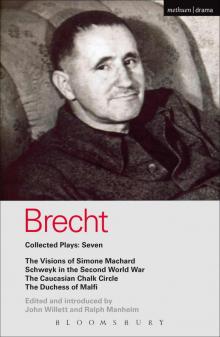 Bertolt Brecht: Mutter Courage und ihre Kinder 7
Bertolt Brecht: Mutter Courage und ihre Kinder 7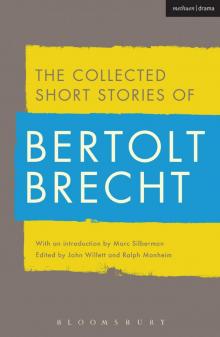 Bertolt Brecht
Bertolt Brecht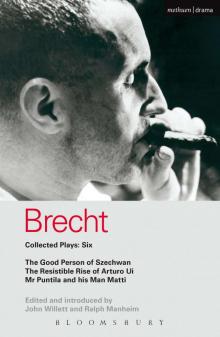 Bertolt Brecht: Mutter Courage und ihre Kinder 6
Bertolt Brecht: Mutter Courage und ihre Kinder 6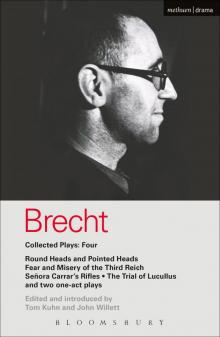 Bertolt Brecht: Mutter Courage und ihre Kinder 4
Bertolt Brecht: Mutter Courage und ihre Kinder 4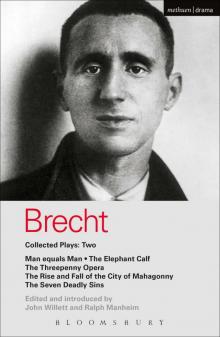 Bertolt Brecht: Mutter Courage und ihre Kinder 2
Bertolt Brecht: Mutter Courage und ihre Kinder 2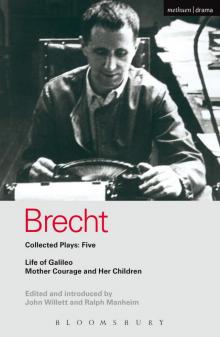 Bertolt Brecht: Mutter Courage und ihre Kinder 5
Bertolt Brecht: Mutter Courage und ihre Kinder 5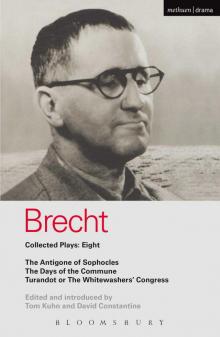 Collected Plays, Volume 4 (Bertolt Brecht: Plays, Poetry & Prose) 8
Collected Plays, Volume 4 (Bertolt Brecht: Plays, Poetry & Prose) 8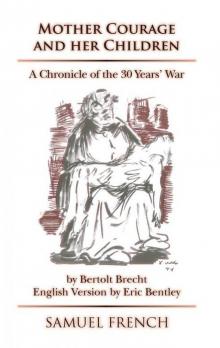 Mother Courage and Her Children
Mother Courage and Her Children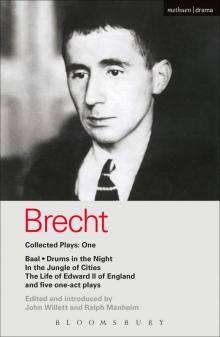 Bertolt Brecht: Mutter Courage und ihre Kinder 1
Bertolt Brecht: Mutter Courage und ihre Kinder 1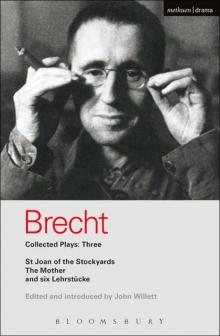 Brecht Collected Plays: 3: Lindbergh's Flight; The Baden-Baden Lesson on Consent; He Said Yes/He Said No; The Decision; The Mother; The Exception & the ... St Joan of the Stockyards (World Classics)
Brecht Collected Plays: 3: Lindbergh's Flight; The Baden-Baden Lesson on Consent; He Said Yes/He Said No; The Decision; The Mother; The Exception & the ... St Joan of the Stockyards (World Classics)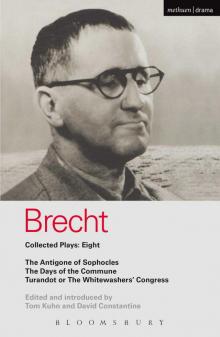 Brecht Plays 8: The Antigone of Sophocles; The Days of the Commune; Turandot or the Whitewasher's Congress: The Antigone of Sophocles , The Days of the Comm (World Classics)
Brecht Plays 8: The Antigone of Sophocles; The Days of the Commune; Turandot or the Whitewasher's Congress: The Antigone of Sophocles , The Days of the Comm (World Classics)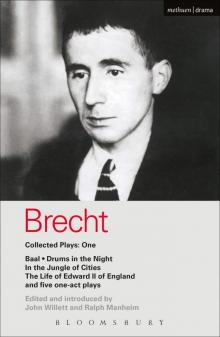 Brecht Collected Plays: 1: Baal; Drums in the Night; In the Jungle of Cities; Life of Edward II of England; & 5 One Act Plays: Baal , Drums in the Night , In the Jungle of Ci (World Classics)
Brecht Collected Plays: 1: Baal; Drums in the Night; In the Jungle of Cities; Life of Edward II of England; & 5 One Act Plays: Baal , Drums in the Night , In the Jungle of Ci (World Classics)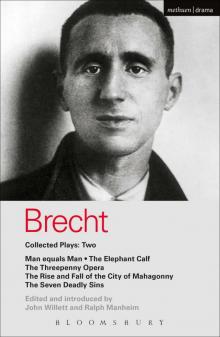 Brecht Collected Plays: 2: Man Equals Man; Elephant Calf; Threepenny Opera; Mahagonny; Seven Deadly Sins: Man Equals Man , Elephant Calf , Threepenny Ope (World Classics)
Brecht Collected Plays: 2: Man Equals Man; Elephant Calf; Threepenny Opera; Mahagonny; Seven Deadly Sins: Man Equals Man , Elephant Calf , Threepenny Ope (World Classics)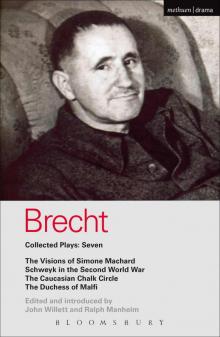 Brecht Collected Plays: 7: Visions of Simone Machard; Schweyk in the Second World War; Caucasian Chalk Circle; Duchess of Malfi (World Classics)
Brecht Collected Plays: 7: Visions of Simone Machard; Schweyk in the Second World War; Caucasian Chalk Circle; Duchess of Malfi (World Classics)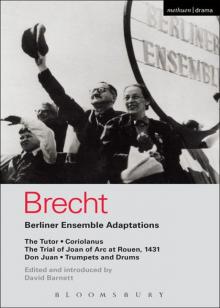 Berliner Ensemble Adaptations
Berliner Ensemble Adaptations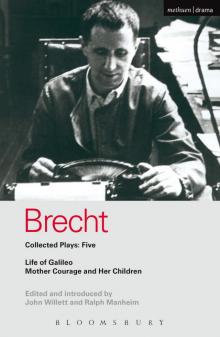 Brecht Collected Plays: 5: Life of Galileo; Mother Courage and Her Children (World Classics)
Brecht Collected Plays: 5: Life of Galileo; Mother Courage and Her Children (World Classics)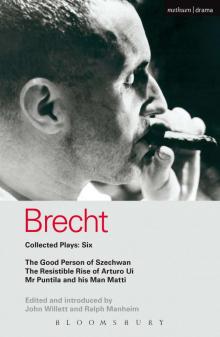 Brecht Collected Plays: 6: Good Person of Szechwan; The Resistible Rise of Arturo Ui; Mr Puntila and his Man Matti (World Classics)
Brecht Collected Plays: 6: Good Person of Szechwan; The Resistible Rise of Arturo Ui; Mr Puntila and his Man Matti (World Classics)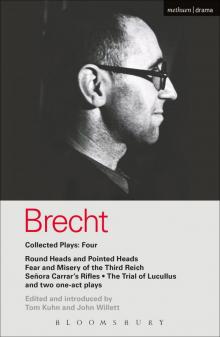 Brecht Collected Plays: 4: Round Heads & Pointed Heads; Fear & Misery of the Third Reich; Senora Carrar's Rifles; Trial of Lucullus; Dansen; How Much Is ... and Misery , Carr (World Classics)
Brecht Collected Plays: 4: Round Heads & Pointed Heads; Fear & Misery of the Third Reich; Senora Carrar's Rifles; Trial of Lucullus; Dansen; How Much Is ... and Misery , Carr (World Classics)